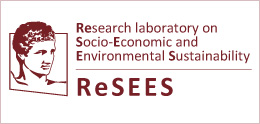ReSSES at the Climate Change Symposium: Threats, Challenges, Solutions for Greece" at the American College of Greece, DEREE
Wednesday 3rd April 2019 "Climate Change Symposium: Threats, Challenges, Solutions for Greece" at the American College of Greece, DEREE. Aiming at presenting the scientific content of Climate Change in Greece, specialists from different fields joined the panel showing how to formulate holistic solutions able to combat this global problem and eliminate its negative impacts for the environment and the society.
- Prof. Phoebe Koundouri, AUEB, focused on the role of UN SDSN Greece, which is co-chaired by her and Prof. Andreas Papandreou, the current overuse of Natural resources, due to lack of valuation studies and also for the Climate KIC Greece, of which she is the president and its strategic role in tackling Climate Change by connecting innovation and research with the market and the policy makers.
- Yannis Stournaras, Governor, Bank of Greece underlined the necessity for a shift from linear to circular economy, where the value is maintained as long as possible and hence, the waste is minimal. He also showed that the Climate Change risks are financial risks as well, which in Greece particularly affect significantly Agriculture, Tourism and water availability and hence, they need to be addressed not only by the policy, but by the banking sector as well.
- Socrates Famellos, alternate minister for energy and environment, declared that the Climate Change is the most important threat of nowadays and to be faced, a new political model with main focus in adaptation needs to arise. The targets of the new political model will include: energy efficiency in building, use of secondary fuel, new spatial planning about RES, electromobility and new financial tools.
- Prof. Dimitris Lalas focused on the a Science based approach to Climate Change risk estimates, where uncertainty is solved by considering a number of different scenarios and their evolution
- Prof. Manolis Pleionis, Director and President of the board of directors of the National Observatory of Athens (NOA), presented the different projects of NOA (METEO, BEYOND, PANGEA etc) aiming in giving real-time report on potential risks such Forest fire etc. The need for these innovative platforms, as he said, derives from the intensity and frequency of disasters related to CC
- Nikos Charalambides, Executive Director of Greenpeace Greece, emphasised on the need for structural changes in the economies and the redirection of the investments to green alternatives.
- Dr. Michael T. Valahas, Director, Centre of Excellence for sustainability, Office of public affairs, the American College of Greece, focused on the research held in DEREE and the aim of bringing students close with CC issues
- Prof. Andreas Papandreou, Professor of Environmental Economics, National and Kapodistrian University of Athens addressed three main questions:
1. Why does the economy fail to protect our climate?
2. What level of CC should we aim for?
3. What policy tools to achieve our CC goals?
Also, he focused on the history of energy transition underlying the importance of public policy in driving change, as for example a carbon tax alone cannot fulfill its purpose if not followed by reallocation of revenues or a green new deal.
After the panel discussions, participants had the chance to join games related to Climate Change to enhance the understanding of CC impacts, identify level of awareness and assist the process of formulating relevant solutions. The games were: ‘SDGs and Climate’, an interactive test of knowledge game, ‘Debating Tennis’, a game in which players debate and argue in favour or against motions/statements related to climate change and ‘Stabilization Wedges Game’, a team-based exercise (a Board Game) that teaches players about the scale of the greenhouse gas problem.




 76 Patission Str.
76 Patission Str. 30 2108203 455
30 2108203 455
